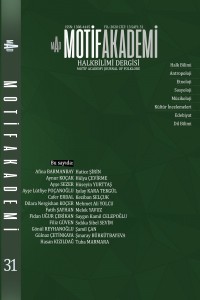Öz
XXI. Yüzyıl Türk sosyo-kültürel yaşamında televizyonun büyük bir etkiye sahip olduğu inkâr edilemez bir gerçektir. Kültürel kabuller açısından olumlu ve olumsuz anlamda toplumu değiştirip dönüştürme yetisine sahip yapısıyla görsel/işitsel basının toplum kültürüyle uyuşmadığı noktalarda zaman zaman toplumsal tepkiler almakla birlikte bu tepkilerin verilmediği ya da durumun göz ardı edildiği de görülmektedir. Türk toplumunun cinsiyet ve aile kavramlarının çeşitli tabularla örülü ve toplumsal normlarla çevrili olması bu tepkilerdeki temel dinamiklerden biridir. Bu dinamikler çerçevesinde özellikle aile fertlerinin dışarıdan aynı kişiyle kuracağı cinsel ilişkilerde sınırlar büyük oranda belirlenmiş ve yasaların ötesinde bir örfi hukukla şekillendirilmiştir. Bu noktada kardeşlerin aynı kişiyle kurabilecekleri ilişkiler çok özel koşullara bağlanmış, sıradanlaşması veya normal bir kabule dönüştürülmesi engellenerek toplumsal reddiyelerle bu yöndeki ilişkilerin önüne geçilmeye çalışılmıştır. Toplumdaki bu yapıya karşın TV’de özellikle reyting saatlerinde yayınlanan bazı diziler belirtilen kabullerin ötesine geçerek bu ilişkileri kabul edilebilir ya da normal bir yaşam şekli olarak aktarmaktadır.
Yukarıdaki ifadelere bağlı olarak bu çalışmada; Türk halkının günlük yaşamında karşılaştığı “kardeş” tiplerin “Fazilet Hanım ve Kızları”, “Kadın” ve “Kardeş Çocukları” adlı dizilerde nasıl bir karaktere büründüğü ve düşünsel yapıları ortaya çıkarılmaya çalışılmıştır. Türk halkının günlük yaşamında sunulan idealize edilmiş kardeş ilişkileriyle bu dizilerdeki “kardeş” tipi algısının Anadolu insanının bakış açısını, duyarlılıklarını, inanç ve değerlerini yansıtmadığı, toplumsal normlar açısından ahlaki olmayan ilişki çeşitlerinin kıskançlık temelli olarak sıradanlaştırıldığı ve bu yapıların üç dizide de şaşırtma, düşündürme, ilgi çekme yolları denenerek izlenme oranının arttırılmaya çalışıldığı tespit edilmiştir. Bu bağlamda söz konusu dizilerle ilgili üniversite öğrencileriyle orta yaş üstü insanlara doküman analizi yöntemi kapsamında anket uygulanmış; anket sonuçlarına göre söz konusu tiplerle ilgili değerlendirmeler yapılmış ve halkbilimin araştırma yöntemlerinden yararlanılmıştır.
Çalışmanın sonucunda; “Fazilet Hanım ve Kızları”, “Kadın” ve “Kardeş Çocukları” dizilerindeki “kardeş” tiplemelerinin işleniş şeklinin Türk toplumunun normlarının bir parçasıymış gibi verilmesinin; özellikle de “kardeş” olgusunun rekabet eden tiplere dönüştürülmesinin ve kardeşin kardeşe yaptığı “kötülük”ün çok sıradanmış gibi sunulmasının yansımaları yorumlanmıştır.
Anahtar Kelimeler
Kaynakça
- Brun, J. (2003). Stoa felsefesi. (Çev.: Medar Atıcı), İstanbul: İletişim.
- Bozbeyoğlu Çavlin, A.– Koyuncu, E.-Kardam, F. – Sungur, A. (2010). Ailenin karanlık yüzü: Türkiye’de Ensest. Sosyoloji Araştırmaları Dergisi, 13 (1), 1-37.
- Genç, Ş. -Coşkun, S. (2013). Ensest. TBB Dergisi, S.106, 215-260.
- Freud, S.(2016). Psikopatoloji. (Çev.: Aycan Özüpek), Ankara:Yason.
- Ulutaş, S.(2019). Kıskançlığın Sinemada Estetik Varoluşu: Zeki Demirkubuz Sinemasında Kıskançlık. Turkish Studies, 2/1, 14 (3), 1824-1845.
- Sönmez Şen, Ü. (2016). Türk Romanında Kötülük- Başlangıçtan 1950’ye. İstanbul: Yitik Ülke.
Öz
It is an undeniable fact that 20th century has been a period in which television has greatly influenced the Turkish socio-cultural life. In terms of cultural acceptance the audio / visual media are in a positive and negative sense transforms the society. In some TV series, social reactions are taken from time to time at points that are incompatible with social culture; it is also seen that these reactions are not given or the situation is ignored. The fact that the concepts of gender and family in Turkish society are covered with various taboos and surrounded by social norms is one of the main dynamics in these reactions. Within the framework of these dynamics, the limits of sexual relations that family members will establish with the same person from the outside have been determined to a large extent and have been shaped by a customary law beyond the laws. At the specified point, the limits of sexual relations, especially with the same members of the family, have been determined to a large extent and have been shaped by a customary juristic beyond the laws. At this point, the relationship that the brothers can establish with the same person are bound to very special conditions, preventing them from becoming ordinary or turning into a normal acceptance and preventing the relations in this direction with social rejection. Despite this structure in the society, some TV series for their rating broadcast going beyond their stated assumptions and transmit these relations as an acceptable or normal way of life.
Depending on the above statements, in this study; going through the “Fazilet Hanım ve Kızları”, “Kadın” and “Kardeş Çocukları” series, it is examined that what kind of character and intellectual structures of the “sisterhood/brotherhood” types, Turkish people encounter in their daily life. The idealized sibling relationships in the daily life of the Turkish people do not reflect the perspective, sensitivities, beliefs and values of the Anatolian people's perception of the “sibling” type in these TV series. It has been determined that the method such as exaggerations, mystifications, puzzles and appeal have been used to increase the rating. In this context, university students and people above middle age were asked a questionnaire regarding the series in question within the scope of document analysis method; according to the results of the questionnaire, evaluations about the mentioned types were made and research methods of folklore were used.
As a result of the study; giving the way that the sisterhood/brotherhood” types in “Fazilet Hanım ve Kızları”, “Kadın” and “Kardeş Çocukları” are treated as a part of the norms of Turkish society; especially the reflections of transforming the “Sisterhood/brotherhood” phenomenon into competing types and accepting the “evil” that is done to someone by his brother as a very ordinary act, were also analyzed.
Anahtar Kelimeler
Media TV Series sisterhood/brotherhood jealousy cultural retention
Kaynakça
- Brun, J. (2003). Stoa felsefesi. (Çev.: Medar Atıcı), İstanbul: İletişim.
- Bozbeyoğlu Çavlin, A.– Koyuncu, E.-Kardam, F. – Sungur, A. (2010). Ailenin karanlık yüzü: Türkiye’de Ensest. Sosyoloji Araştırmaları Dergisi, 13 (1), 1-37.
- Genç, Ş. -Coşkun, S. (2013). Ensest. TBB Dergisi, S.106, 215-260.
- Freud, S.(2016). Psikopatoloji. (Çev.: Aycan Özüpek), Ankara:Yason.
- Ulutaş, S.(2019). Kıskançlığın Sinemada Estetik Varoluşu: Zeki Demirkubuz Sinemasında Kıskançlık. Turkish Studies, 2/1, 14 (3), 1824-1845.
- Sönmez Şen, Ü. (2016). Türk Romanında Kötülük- Başlangıçtan 1950’ye. İstanbul: Yitik Ülke.
Ayrıntılar
| Birincil Dil | Türkçe |
|---|---|
| Konular | Türk Halk Bilimi |
| Bölüm | Makaleler |
| Yazarlar | |
| Yayımlanma Tarihi | 15 Eylül 2020 |
| Gönderilme Tarihi | 22 Ağustos 2020 |
| Yayımlandığı Sayı | Yıl 2020 Cilt: 13 Sayı: 31 |



